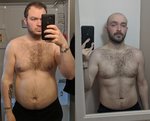Hello, first time poster.
I guess to make a long story short, in the past 18 months or so, I went from around 240 lb down to 180, and really, most of that progress was made in the past year, since COVID hit.
Anyway, things have been going pretty great, but it seems like I'm stuck at around 180 lb, no matter what I do. I bought a stationary bike, and picked up my exercise from around 3 days per week to about 5, starting a month ago, and even though I'm tracking my calories with myfitnesspal, and I'm at a 400 to 500 calorie deficit everyday, I'm just bouncing from 180 to 183.
That all being said, I'm noticing that for the first time my abs are starting to poke out, and my general shape is changing, though my weight has been plateaued for the past month. Should I just keep my head down and keep doing what I'm doing? I've been patient for the better part of 2 years, so I don't mind waiting longer, but is there a certain point where your weight will be stubborn and stay put, but your body will still transform? Ideally, I would like to get down to around 150lbs. I've read here and there about giving your body a maintenance break for a couple of weeks, and then getting back at it. Is that a valid strategy?
And for some last details, I've been doing 16/8 IF, at around 1500 calories, with an almost completely vegan diet, aside from whey protein. I've been doing everything consistently for this entire time, aside from the whey protein which I just added a couple of weeks ago. 5'9", as well.
My only form of exercise has been (DDP) yoga and cycling. Not looking to "bulk up" or anything.
Included is a picture of where I started, and where I'm at, as of a couple of hours ago.
Appreciated-
I guess to make a long story short, in the past 18 months or so, I went from around 240 lb down to 180, and really, most of that progress was made in the past year, since COVID hit.
Anyway, things have been going pretty great, but it seems like I'm stuck at around 180 lb, no matter what I do. I bought a stationary bike, and picked up my exercise from around 3 days per week to about 5, starting a month ago, and even though I'm tracking my calories with myfitnesspal, and I'm at a 400 to 500 calorie deficit everyday, I'm just bouncing from 180 to 183.
That all being said, I'm noticing that for the first time my abs are starting to poke out, and my general shape is changing, though my weight has been plateaued for the past month. Should I just keep my head down and keep doing what I'm doing? I've been patient for the better part of 2 years, so I don't mind waiting longer, but is there a certain point where your weight will be stubborn and stay put, but your body will still transform? Ideally, I would like to get down to around 150lbs. I've read here and there about giving your body a maintenance break for a couple of weeks, and then getting back at it. Is that a valid strategy?
And for some last details, I've been doing 16/8 IF, at around 1500 calories, with an almost completely vegan diet, aside from whey protein. I've been doing everything consistently for this entire time, aside from the whey protein which I just added a couple of weeks ago. 5'9", as well.
My only form of exercise has been (DDP) yoga and cycling. Not looking to "bulk up" or anything.
Included is a picture of where I started, and where I'm at, as of a couple of hours ago.
Appreciated-
Attachments
Last edited:

